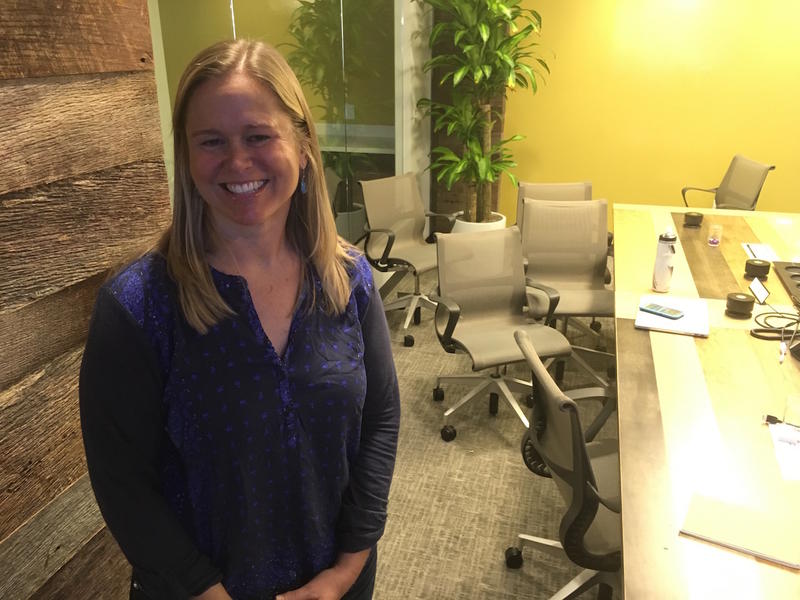
By Blake Farmer
Physicians who seem to be over-prescribing painkillers or working with addicted patients may now get a tap on the shoulder from a Nashville startup working on behalf of insurors. The company uses sophisticated algorithms to identify problem patients and providers. But since this is such a delicate issue with doctors, they’ve hired a pharmacist to initiate those chats who — herself — is in recovery from opioid abuse.
Nancy Hooper’s past is no secret around Axial Healthcare’s trendy office in a converted warehouse, with stand-up desks and beer on tap in the break room. Data scientists spend their days analyzing opioid-related insurance claims for more than 100-million Americans.
After a few goodbyes on a recent afternoon, Hooper heads out to her weekly meeting with other pharmacists who’ve struggled with substance abuse.
Alcohol was the problem in college. But then her career path introduced her to more powerful drugs. So she began sneaking painkillers meant to be destroyed. When that wasn’t enough, she forged prescriptions for herself. She realized she was in trouble and tried to quit many times.
“I would go back into work and be withdrawing, and it was right there,” she says.
Eventually, she was caught.
“Five years ago, I was sitting in jail,” she says. “Life as I knew it was over.”
But she bounced back after a few months behind bars. It was a long process, but Hooper was able to get her pharmacist license reinstated. Still, it became clear handling the pills that nearly ruined her life might not work long term.
Turning Addiction Into A Weapon For Good
“When I first counted out some Percocet, my hand is shaking. I felt like was doing something wrong,” she says.
Then she recalled a jovial guy who offered her a job years before, just as she was completing drug court. She had shared her story as part of an opioid forum.
“I think I came right up on stage and gave you a hug,” says Axial’s CEO John Donahue, sitting across a conference table from Hooper.
He says he knew Hooper’s background could be a secret weapon for his new company. They had deep-pocketed investors, contracts with giant insurance companies and all this data. The claims reveal the prescribing habits of physicians and even predict which patients are at risk of overdose, suicide or having a baby born in withdrawal.
But the sensitive data needed a messenger — someone to break the news in a constructive way.
“Having a peer, personalized experience of this nature with Nancy’s journey and Nancy’s professional experiences, is unmatched in its impact on the ability to change behavior,” Donahue says.
Hooper leads a team that contacts prescribers, and she doesn’t always share her recovery story, but she does when it’s needed.
“They’re like, ‘well you just don’t understand how hard it is for these patients to come off this medication.’ Then I can say, ‘actually, I do.'”
Touchy Conversations All Around
Axial sees what prescribers may not. Maybe a patient never told them they also have a prescription for anxiety medication — a potentially deadly combination. Or perhaps they’re going to the emergency room regularly for pain pills and still coming in for their monthly opioid refill. Or some doctors just may not appreciate how frequently they go above dosage guidelines.
Hooper says the phone calls are often initially met with resistance and excuses, since many times the prescribers in question didn’t start the patients on opioids.
“I hear the ‘I’ve inherited these patients’ a lot. ‘I didn’t get them in this mess. Somebody else did. I’m just trying to do the best that I can to take care of them now.’ So I do hear that a lot.”
But with the right explanation, the information can change behavior.
“It’s very interesting to see all of that data in front of your face at one time,” says Erin Galloway, a physician assistant whose former pain clinic in Nashville was red-flagged by Axial.
She got a call from Hooper, and that touchy conversation led some prescribers in the practice to lower dosages and get some patients off opioids altogether. But Galloway says that triggers another difficult exchange — with a patient.
“I always kind of lead with, ‘I know your number one priority is pain relief. My number one priority is your safety,’ and so we have to meet in the middle,” she says. “And I am always going to win on the side of safety.”
Whether with doctors or patients, Nancy Hooper sees a common thread — successfully battling the opioid epidemic may take hundreds of thousands of one-on-one uncomfortable conversations.
Via Nashville Public Radio.
